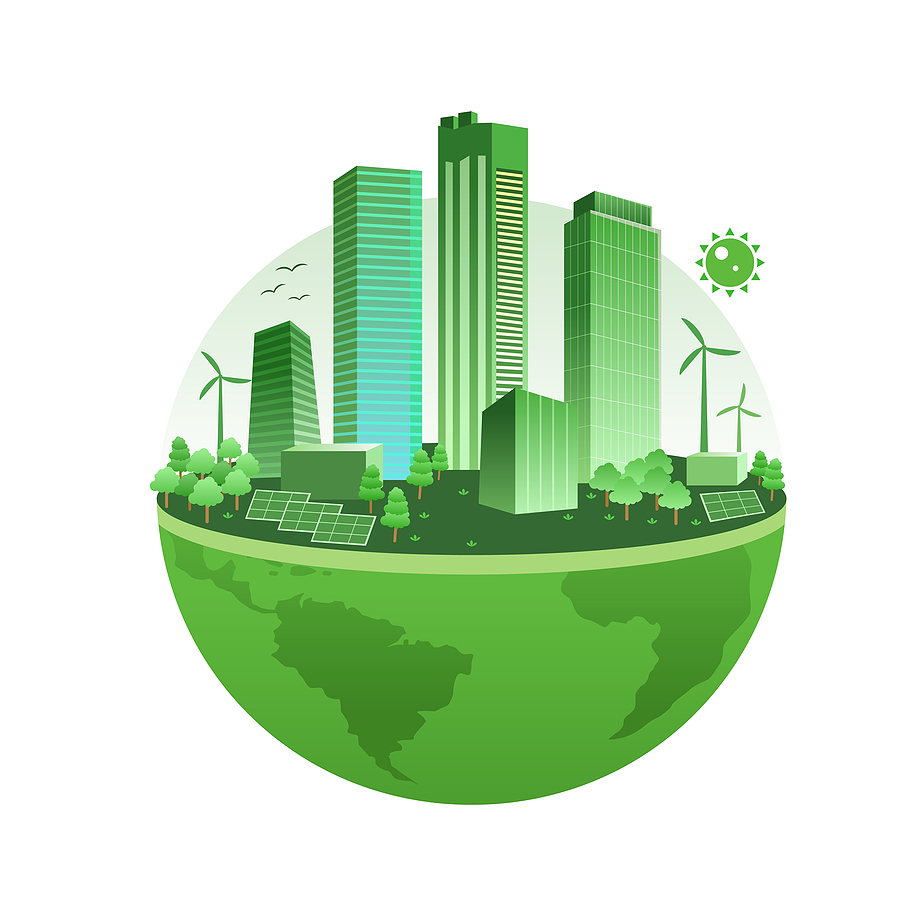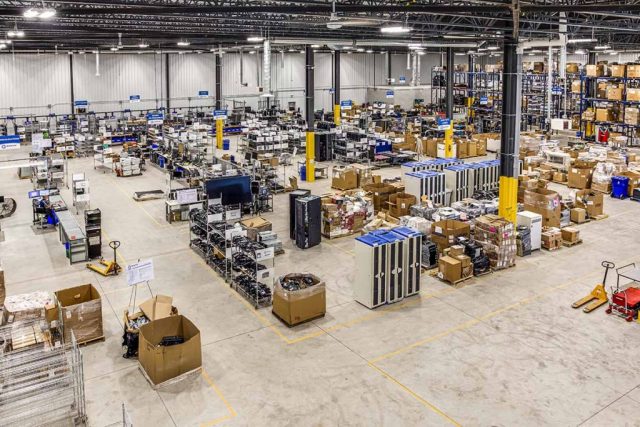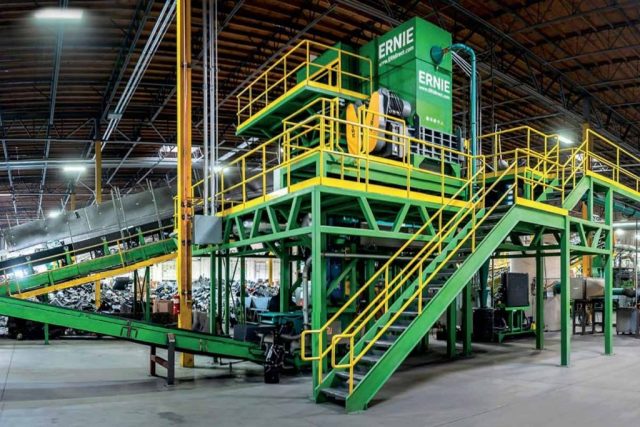
Canada-based Quantum Lifecycle Partners
Quantum Lifecycle Partners recently released its first impact report, showcasing the organizations environmental gains made in the 2022 fiscal year. The data revealed that an impressive 83.6 million pounds of e-scrap were recycled and a whopping 410,000 assets and components were reused between February 1, 2021 and January 31, 2022. As a result of these efforts, it is estimated that 83,363 metric tons of carbon dioxide equivalent emissions were prevented from entering the atmosphere.
Quantum, a company owned by two different shareholder groups, Combined Metal Industries and Giampaolo Group, was founded in 2019 through the unification of Shift Recycling and Global Electric Electronic Processing (GEEP). The organization has several Canadian sites as well as an installation located in Costa Rica.
Released last month, Quantum’s report highlighted the company’s commitment to fostering a more sustainable environment by outlining ambitious targets for the coming year. Aiming to reuse 500,000 electronics assets and components, as well as recycling 80 million pounds of commodities, the proposed figures represent an increase of 22% for reuse, and a decrease of 4% for commodities recovery when compared to fiscal year 2022 numbers.

Quantum’s Employee Makeup and Expansion Plans
Quantum’s employee makeup was published in this document as well. There are close to 450 staff members, 77% of them are male while 23% are female. The average employee’s age is 42, and most have worked at Quantum for around 5.5 years.
“What we do, electronics reuse and recycling, has always been good for the planet. This report lays the framework to take our efforts to the next level,” President of Quantum, Gary Diamond, stated in a press release. “We look forward to reporting on our progress each year.”
Quantum proudly operates in nine Canadian cities with plants located in Barrie, Brampton, Ottawa and Toronto (Ontario), Calgary and Edmonton (Alberta), Montreal (Quebec), and Vancouver (British Columbia). The company looks to expand even further with the February 2021 acquisition of Costa Rican facilities, alongside January 2022’s purchase of REfficient, an Ontario-based reuse-focused corporation with a location in Hamilton.
In the past few years, several major IT asset disposition processors have made strides towards sustainability. Quantum, for instance, being the largest ITAD and e-scrap recycling company in Canada releasing its first sustainability report. Similarly, ERI, a US-based e-scrap recycling company, also released its first ESG report last year.
United States-Based ERI
On December 14th, ERI, a leader in electronics recycling and ITAD services, published the organization’s inaugural 2020 Environmental, Social and Governance (ESG) & Data Security report. This document serves as an overview of ERI’s operations, providing several details about the company.
“From working with many of the world’s largest brands, who turn to us to help them achieve their sustainability and cybersecurity/data destruction goals, we know that ESG, the circular economy and hardware data destruction are all massively growing areas that are receiving laser focus across all industries,” ERI’s chairman and CEO, John Shegerian, stated in a press release. “ESG is something ERI has been doing as part of our very DNA, not just in terms of our own goals and performance but for all the companies we work with and help to achieve their own ESG objectives.”

Today, ERI has established nine processing sites in the United States with a total of 718 staff members. This includes 435 full-time employees, and 283 temporary employees. The ethnic composition of ERI’s workforce was revealed to be 38.70% Hispanic, 30.63% white, 20.40% African American, and 9.60% Asian/other, with 0.67% unspecified.
Among supervisors only, the figures stood at 41% white, 32% Hispanic, 22% African American, and 5% other respectively. Breaking down the gender diversity further showed that 66.67 % of the staff were male, while 31.78 % were female, and 1.55 % remained unidentified. When it comes to those holding various vice president titles, a majority 55.60 % were female and 44.40 % were male.
In 2020, ERI managed to recycle a staggering number of materials: 41.5 million pounds of metal, 23.1 million pounds of plastic, 16.2 million pounds of glass, and 11.4 million pounds of scrap-containing precious metals were reclaimed from the environment. ERI reported that a total of 113.7 million pounds of materials were recycled. Of that amount, 69 million pounds were gathered from retailers while 33,000 pounds came in through their mail-in recycling program, launched in collaboration with UPS.
According to Paul Williams, ERI’s VP for Communications and Media Relations who spoke with E-Scrap News, 2.3 million pounds of other recyclables were recovered, and 1.3 million pounds of batteries had been collected by the end of last year. The remaining 17.9 million pounds were comprised of non-electronic waste such as wood shavings, and residual materials. Looking towards the future, ERI has set a progressive goal of 1 billion additional pounds to be recycled by 2030.
Sustainability Plans
Electronic waste has emerged as the most sizable waste stream worldwide. This is mainly due to the rapid production of newer and more advanced technologies, leading existing models to be outdated in a much shorter time frame than before. Every year, 100 billion pounds of electronic waste are generated and only 20% of this total gets recycled responsibly. There is no definite knowledge regarding what happens to the other 80%. This e-waste is likely thrown in landfills, stockpiled away, or shipped off to developing nations where it undergoes improper disposal processes.
The importance of reusing and recycling electronics is often overlooked, yet it is a significant source for reducing the pollution in landfills. Studies have shown that up to 70% of heavy metal contamination originates from e-waste. Without proper disposal methods, electronic waste poses serious health risks and can cause irreparable damage to the environment.
Sustainability is a complex concept that includes environmental, social, and economic issues. To understand and counter the difficulties of e-waste management for ecological development, all factors need to be taken into account and the connection between them must be considered.
Quantum and ERI’s Green Initiatives
Quantum Lifecycle Partners
Quantum looks at the issue of sustainability holistically from every perspective. Quantum works equally hard in both reuse and recycling services; symbolizing the company’s dedication to offering effective strategies which thoroughly absorb the broad implications of e-waste on the planet.
Quantum is in the process of releasing a certified original calculating device which will allow clients to precisely analyze the greenhouse gas impacts of their reuse, refurbishment, and recycling procedures. This will provide direct evidence that carbon emissions have been reduced effectively. The data isn’t for earning “credits”, but for actual discernible emission decrease. Gained information can be used for governmental reporting requirements along with company sustainability and environmental impact documents.
ERI
ERI was able to measure the effect of its recycling and reuse on carbon dioxide equivalent (CO2e) levels and found it has prevented 1.27 billion pounds from being released into the atmosphere. Furthermore, ERI assessed its own environmental impact and discovered that Scope 1 direct emissions such as capital goods, purchases of goods and services, and energy use totaled 2.47 million pounds of CO2e. Additionally, the Scope 2 & 3 indirect emissions (both upstream & downstream impacts) equated to 45.9 million pounds of CO2e.
Doing its part for the environment is a crucial component of ERI’s values. They demonstrate ways to reduce energy use and waste by taking action. ERI’s recycling kits are only one example of this commitment; from the lighting in the offices to collection events for businesses and cities, ERI proves that being environmentally conscious can be a positive force for change. At ERI, they truly believe that going “Greener” is Good!
With companies such as Quantum Lifecycle Partners and ERI leading by example in the ITAD sector, an integral influence is being made. The positive environmental impact that these organizations are creating cannot be understated. IT asset disposition services are invaluable to consumers, businesses, and for the sustainability of our planet.
